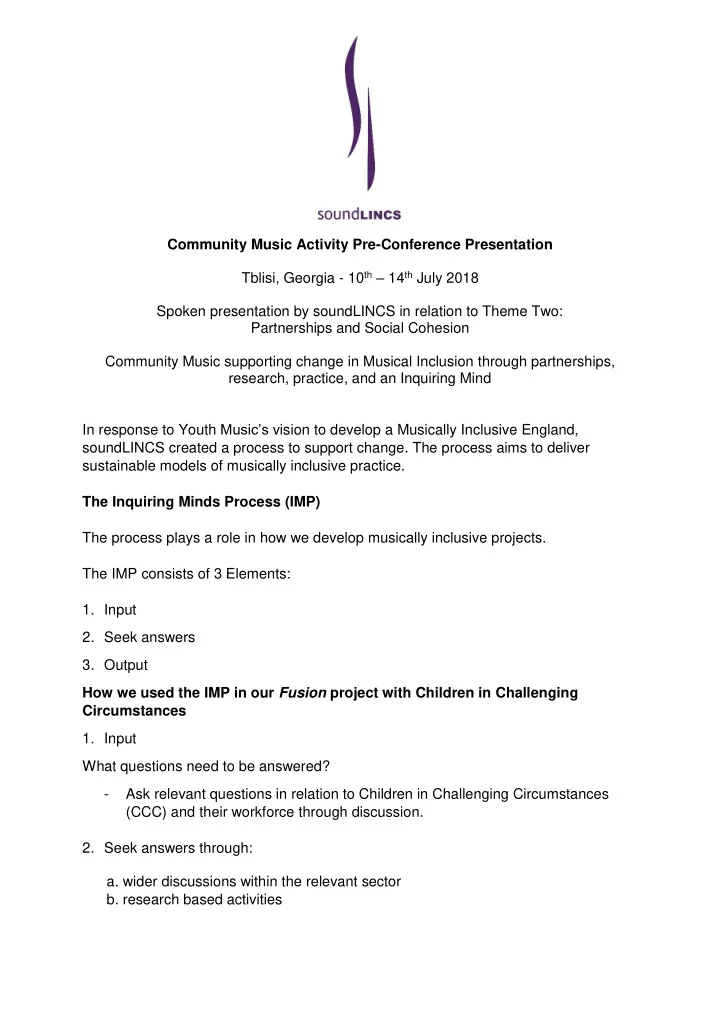

Community Music Activity Pre-Conference Presentation Tblisi, Georgia - 10 th – 14 th July 2018 Spoken presentation by soundLINCS in relation to Theme Two: Partnerships and Social Cohesion Community Music supporting change in Musical Inclusion through partnerships, research, practice, and an Inquiring Mind In response to Youth Music’s vision to develop a Musically Inclusive England, soundLINCS created a process to support change. The process aims to deliver sustainable models of musically inclusive practice. The Inquiring Minds Process (IMP) The process plays a role in how we develop musically inclusive projects. The IMP consists of 3 Elements: 1. Input 2. Seek answers 3. Output How we used the IMP in our Fusion project with Children in Challenging Circumstances 1. Input What questions need to be answered? - Ask relevant questions in relation to Children in Challenging Circumstances (CCC) and their workforce through discussion. 2. Seek answers through: a. wider discussions within the relevant sector b. research based activities
c. practical delivery of music and workforce development activities d. gather and analyse 360° feedback 3. Output Present findings and create documentation to apply and transfer learning from a single project to the wider sector. The output for Fusion is a Report and an Executive Summary: IMP is a creative response to our experience of being a community music organization that provides developmental music making activities for CCC, and workforce development activities for the adults who support them. It is considered to be an approach that will deliver our aim of developing sustainable models of Musically Inclusive practice, and thus a Musically Inclusive England. IMP is built on the principals of Community Music. It is an approach for facilitating a shared developmental journey. Ensuring that collaboration is the context for exploring, discussing and agreeing the route and, if desired, the destination. The importance of Partnerships in developing musically inclusive practice soundLINCS believe that models of Musically Inclusive practice are most likely to be sustained when they are supported by the non-music sectors. An example is Fusion , a workforce development project for Children’s Services Practitioners.
Non-music sectors often have statutory responsibilities to improve outcomes for the participants (CCC) and are therefore more likely to act upon the positive impact that music can contribute if they are involved in discussing, shaping and witnessing the projects they agree to partner with. By fostering collaboration with the professional workforce (who care, support and educate CCC), everyone agrees on a purpose. This results in a feeling of ownership of the project between everyone. The collaboration forms the act of an inclusive practice. The inclusive journey begins from the very outset, one which values all contributions equally, creates ownership and brings equality and power. Doing so results in a strong belief that anything is possible and everything is achievable. Partnerships For each IMP project, soundLINCS brings together keen and interested people from a minimum of two strategic partners and combines them with the organisation’s workforce of experienced Music Facilitators (MFs). The partners usually include a non-music organisation (such as Local Authority Children’s Services, Leaving Care Service or Youth Justice Team) and a Higher Education Institute that collaborate to design, undertake and oversee Research Activities. Each of the groups are in contact working with the participants such as the young people or the workforce.
Recommend
More recommend